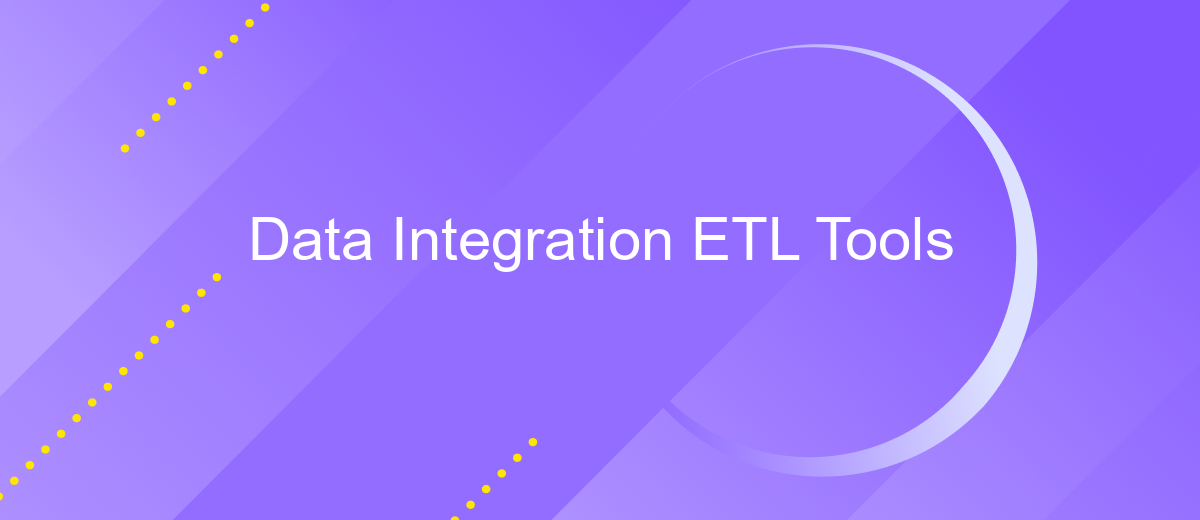Data Integration ETL Tools
Data Integration ETL (Extract, Transform, Load) tools are essential for modern businesses to manage and analyze large volumes of data from diverse sources. These tools streamline the process of extracting data, transforming it into a usable format, and loading it into a destination system, enabling organizations to make informed decisions and gain valuable insights efficiently.
Introduction
Data integration is a critical process that enables businesses to consolidate data from various sources into a unified view. This process is essential for accurate reporting, analysis, and decision-making. Extract, Transform, Load (ETL) tools play a pivotal role in this integration, automating the workflow and ensuring data consistency and reliability.
- Extract: Gathering data from multiple sources.
- Transform: Converting data into a suitable format.
- Load: Importing data into a destination system.
Modern ETL tools, such as ApiX-Drive, simplify data integration by offering user-friendly interfaces and robust automation capabilities. These tools reduce the complexity of setting up integrations and help businesses streamline their data workflows, ensuring that data is always up-to-date and accessible. By leveraging ETL tools, organizations can enhance their data management strategies and drive better business outcomes.
ETL Tools Overview

ETL (Extract, Transform, Load) tools are essential for managing and integrating data from various sources into a unified system. These tools extract data from different databases, transform it into a usable format, and load it into a target database or data warehouse. They streamline the data integration process, ensuring data consistency, quality, and accessibility for analysis and reporting. Popular ETL tools include Apache NiFi, Talend, and Microsoft SQL Server Integration Services (SSIS), each offering unique features and capabilities to meet diverse business needs.
One notable service that simplifies the integration process is ApiX-Drive. It allows users to set up and manage integrations between various applications without requiring extensive technical knowledge. ApiX-Drive supports a wide range of applications and provides a user-friendly interface for creating automated workflows. This service is particularly useful for businesses looking to automate data transfers and streamline operations without investing heavily in custom development. By using ApiX-Drive, organizations can enhance their ETL processes, reduce manual effort, and improve overall data management efficiency.
Types of ETL Tools

ETL tools are essential for efficient data integration, transforming raw data into valuable insights. There are various types of ETL tools available, each catering to different needs and complexities.
- Open-Source ETL Tools: These tools are freely available and can be customized to fit specific requirements. Examples include Talend Open Studio and Apache Nifi.
- Cloud-Based ETL Tools: These tools offer scalability and flexibility, allowing businesses to manage ETL processes in the cloud. Examples include Google Cloud Dataflow and Microsoft Azure Data Factory.
- Commercial ETL Tools: These are paid solutions that often come with robust support and advanced features. Examples include Informatica PowerCenter and IBM InfoSphere DataStage.
- API-Based ETL Tools: Tools like ApiX-Drive facilitate seamless data integration through APIs, making it easier to connect various applications and automate workflows.
Choosing the right ETL tool depends on the specific needs of your organization, including budget, data volume, and the complexity of data transformations required. ApiX-Drive, for instance, is ideal for businesses looking for easy-to-use API integrations without extensive coding.
Features of ETL Tools

ETL (Extract, Transform, Load) tools are essential for data integration processes, enabling the efficient extraction, transformation, and loading of data from various sources. These tools are designed to simplify complex data workflows, ensuring that data is accurately and consistently integrated into target systems.
Modern ETL tools come with a range of features that make them versatile and user-friendly. They support various data sources, including databases, cloud services, and APIs, making it easier to gather data from multiple platforms. Additionally, they offer robust transformation capabilities to clean, enrich, and format data according to specific business requirements.
- Data Connectivity: Support for diverse data sources like SQL databases, NoSQL databases, cloud storage, and APIs.
- Data Transformation: Tools for data cleansing, enrichment, and formatting to ensure data quality and consistency.
- Automation: Scheduling and automation features to streamline recurring data integration tasks.
- Scalability: Ability to handle large volumes of data and scale according to business needs.
- Monitoring and Logging: Real-time monitoring and detailed logging to track ETL processes and troubleshoot issues.
Using services like ApiX-Drive can further enhance the capabilities of ETL tools by providing seamless API integrations. ApiX-Drive allows users to easily connect various applications and automate data workflows without extensive coding, making it an excellent addition to any ETL toolkit.
- Automate the work of an online store or landing
- Empower through integration
- Don't spend money on programmers and integrators
- Save time by automating routine tasks
Conclusion
In conclusion, Data Integration ETL tools play a pivotal role in modern data management by streamlining the process of extracting, transforming, and loading data from multiple sources into a unified system. These tools not only enhance data accuracy and consistency but also significantly reduce the time and effort required for data handling. By leveraging advanced ETL solutions, businesses can make more informed decisions, improve operational efficiency, and gain a competitive edge in the market.
Furthermore, services like ApiX-Drive simplify the integration process by providing user-friendly interfaces and robust automation capabilities. ApiX-Drive allows seamless connectivity between various applications and data sources, ensuring that data flows smoothly and efficiently. This enables organizations to focus on their core activities while maintaining high-quality data integration. As the demand for real-time data processing and analytics continues to grow, the importance of efficient ETL tools and integration services will only increase, making them indispensable assets for any data-driven enterprise.
FAQ
What is ETL in the context of data integration?
Why is ETL important for businesses?
What are some common challenges in ETL processes?
How can businesses automate their ETL processes?
What should I consider when choosing an ETL tool?
Do you want to achieve your goals in business, career and life faster and better? Do it with ApiX-Drive – a tool that will remove a significant part of the routine from workflows and free up additional time to achieve your goals. Test the capabilities of Apix-Drive for free – see for yourself the effectiveness of the tool.


